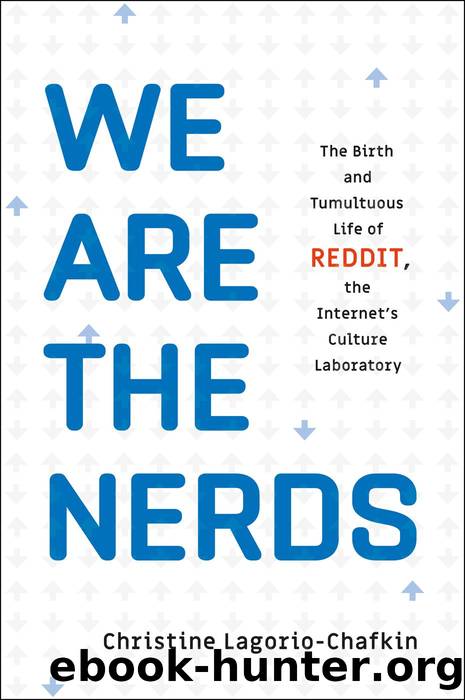We Are the Nerds by Christine Lagorio-Chafkin

Author:Christine Lagorio-Chafkin [Lagorio-Chafkin, Christine]
Language: eng
Format: azw3
Tags: None
Publisher: Hachette Books
Published: 2018-10-01T16:00:00+00:00
Breaking and entering would be the cleanest of the charges piled on Swartz over the following year, all stemming from the late 2010 and early 2011 download of more than four million academic journal documents from JSTOR. In July 2011, a federal grand jury indicted Swartz for wire fraud, computer fraud, and for recklessly damaging a protected computer. By September 2012, another nine felony counts were added. Local charges were piled on, too, but were dismissed. Ultimately he was charged with two counts of wire fraud and eleven violations of the Computer Fraud and Abuse Act.
When the federal charges were unsealed in July 2011, the New York Times dubbed Swartz—who’d taken a job with one of his mentors, Lawrence Lessig, as a fellow in the Edmond J. Safra Center for Ethics at Harvard University—a “folk hero” and a “respected Harvard researcher.” The press was largely loving toward Swartz, the former teenage prodigy, a member of the Internet elite, the crusader for open access online. His friends and allies made glowing statements to journalists, and reiterated, as did his friend David Segal, the director of Demand Progress, that arresting Swartz after the indictment “makes no sense.”
MIT Media Lab’s director, Joi Ito, petitioned the university to have Swartz’s case considered a “family matter,” and to remember that MIT’s policy was that anyone on campus could log into JSTOR or other library databases freely and easily. But the measure of indifference with which MIT had treated the entire endeavor of Swartz to this point, and its general culture of permissiveness toward technical pranks and pursuits, mattered little to U.S. attorney Carmen Ortiz. She persisted doggedly in making the case against Swartz and held it up as an example to hackers everywhere: “Stealing is stealing, whether you are using a computer command or a crowbar.”
To the U.S. Attorney’s office, this was big-time—taking down a major hacker. The Secret Service searched Swartz’s Cambridge apartment on February 11, 2011. After agents observed Swartz—who’d seemed calm—walk out of the apartment building, and then break into a sprint on the street, they followed him to his office at Harvard and searched that as well. They seized as evidence all his devices, including an iMac, three iPods, and three cell phones, including one that agents found buried in Swartz’s living room closet: his old Sidekick, with which he had spent so many afternoons curled up on the Washington Street apartment couch and which had accompanied him when he slept in the cupboard. They kept it as evidence, moving it between the Boston Field Office vault and a lab, and eventually assessed it as having zero monetary value. Courts subpoenaed his friends. Investigators searched for a motive, and fixated on Swartz’s writing from years prior, particularly his Guerilla Open Access Manifesto, with its aggressive title and frank advocacy for the sort of illegal activity in which he’d subsequently partaken.
It was right there, clear as sunlight online, along with all of Swartz’s rambling blog posts, allegories, and news updates. It was
Download
This site does not store any files on its server. We only index and link to content provided by other sites. Please contact the content providers to delete copyright contents if any and email us, we'll remove relevant links or contents immediately.
| Private Equity | Valuation |
| Venture Capital |
The Black Swan by Nassim Nicholas Taleb(6183)
Bad Blood by John Carreyrou(5761)
Pioneering Portfolio Management by David F. Swensen(5599)
Millionaire: The Philanderer, Gambler, and Duelist Who Invented Modern Finance by Janet Gleeson(3565)
Skin in the Game by Nassim Nicholas Taleb(3456)
The Money Culture by Michael Lewis(3276)
Skin in the Game: Hidden Asymmetries in Daily Life by Nassim Nicholas Taleb(3259)
Bullshit Jobs by David Graeber(3172)
The Wisdom of Finance by Mihir Desai(3069)
Blockchain Basics by Daniel Drescher(2884)
Liar's Poker by Michael Lewis(2805)
The Intelligent Investor by Benjamin Graham Jason Zweig(2594)
Mastering Bitcoin: Programming the Open Blockchain by Andreas M. Antonopoulos(2504)
Hands-On Machine Learning for Algorithmic Trading by Stefan Jansen(2491)
Investing For Dummies by Eric Tyson(2467)
Fooled by Randomness: The Hidden Role of Chance in Life and in the Markets by Nassim Nicholas Taleb(2407)
The Power of Broke by Daymond John(2373)
Zero Hour by Harry S. Dent Jr. & Andrew Pancholi(2240)
Market Wizards by Jack D. Schwager(2155)
